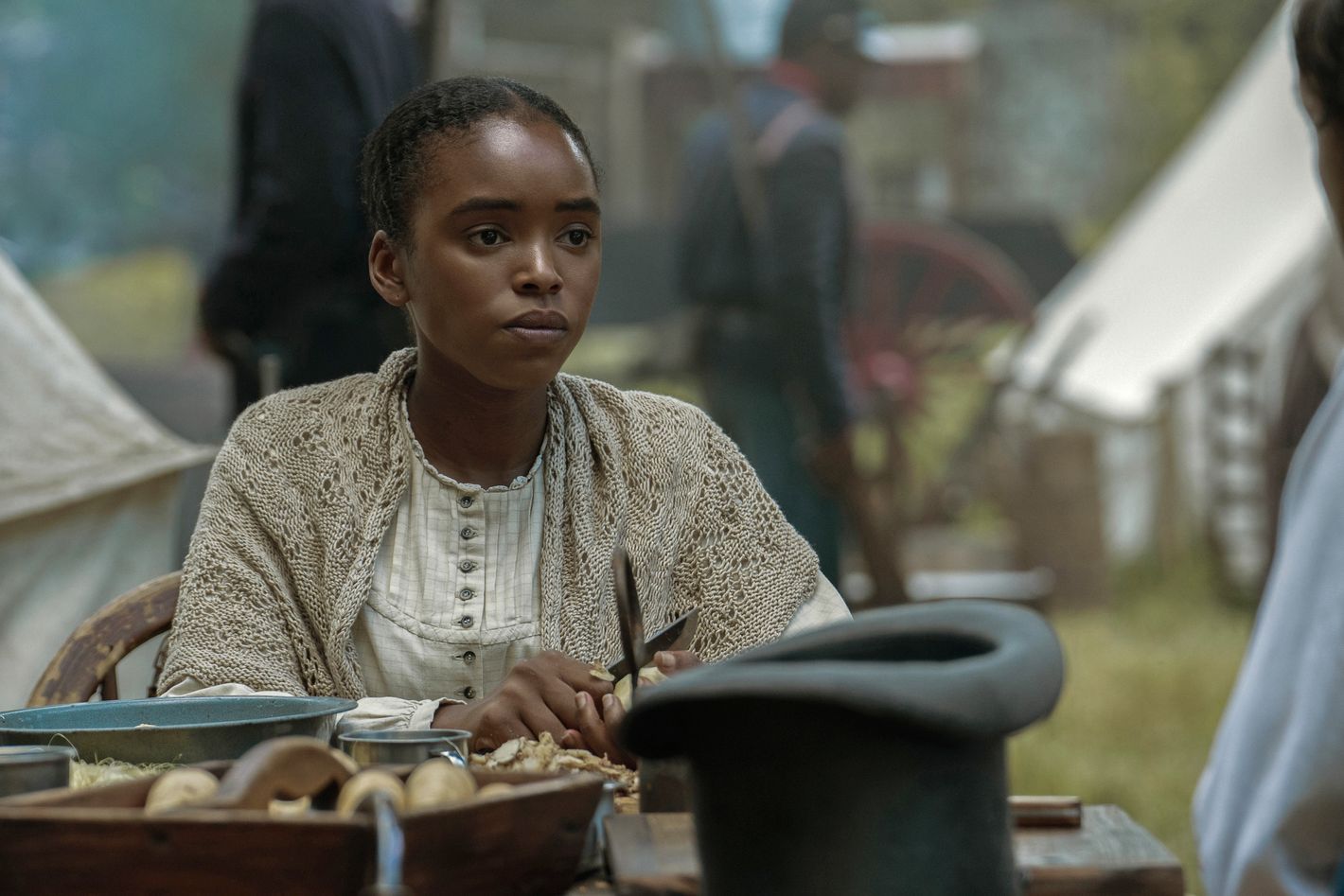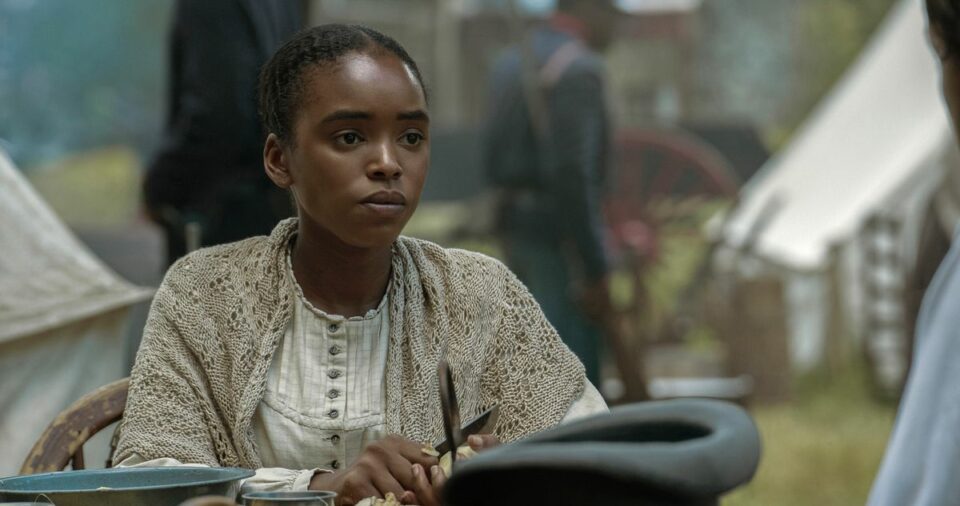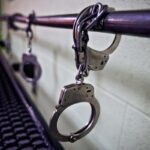[ad_1]

This episode opens with a dream, but whose? While it’s not hard to imagine Booth haunting Stanton’s dreams, the look on Stanton’s face is a bit of a giveaway. He appears as an almost demonic figure of vengeance, the sort that you don’t want pursuing you whether you killed the president or not. And, indeed, this is Booth’s mind we’re seeing, shortly before he wakes to a situation almost as desperate as he’s imagined. Yes, he’s found shelter at the Garrett farm, but it’s not going to last. It’s not proper for a man to stay in the house with a single woman, Farmer Garrett’s comely but Confederacy-worshipping daughter tells him. But there is a spot for him in the barn. (And, again, staying awake in history class means you probably know what’s going to happen next.) It’s not even clear if they’ll be able to get horses for their journey.
Things are not looking great for Booth and Herold. And though Booth insists he’s “survived worse scrapes than this” (including an attack by a crazed fan, by his account), is that really true? What’s more, he seems to be losing even Herold, who’s become increasingly disillusioned as their journey has progressed. Booth uses Herold’s doubt as an excuse to monologue about childhood memories: his father was a jerk but his mother thought he had beautiful hands destined to important deeds. But Herold’s not swayed. It seems like his fanbase is dwindling.
Of course, things aren’t looking so great for Stanton, either, who’s laid up after falling ill at the last episode. That means Colonel Conger (Judd Lormand) and his troops, including the monomaniacal Boston Corbett (who castrated himself, it’s worth remembering, even if that detail isn’t directly relevant to this episode), to pursue Booth and Gerold. And it doesn’t take long for them to catch up with them, yet Booth’s optimism seemingly doesn’t wane even as the soldiers surround the barn. When they announce themselves, it’s time for a standoff.
Could all this be Herold’s fault? That’s Booth’s argument, anyway, as he lists all the mistakes he believes his companion to have made, then calls him “useless” (a moment that also gives the episode its title). So what to do? Storm the barn? Smoke ‘em out? Conger opts for the approach less likely to leave men dead and, though he may believe him to be useless, Booth sends Herold out while proclaiming the sidekick’s innocence. Herold pleads for the soldiers to save Booth and even agrees to go back in to help the negotiations. Herold does his best, but Corbett makes his efforts useless by shooting Booth in the back of the head (“just like Lincoln” he’s soon told).
Booth’s doomed, but, actor to the end, he nonetheless takes the opportunity to play one more big scene. “Tell mama don’t look at my hands,” he says as life leaves him, then mumbles “useless” as consciousness slips away. Is this a moment of recognition? That would seem out of character. Yet maybe death offers some clarity.
When Stanton finally arrives, the barn is a smoldering ruin and Booth is long gone from this world. “The quicker madman was ours,” he’s told. But Stanton still gets the last word, telling Booth’s corpse, “You’re no one now.” He has further plans: bury him somewhere no one will ever find him.
So what comes next, both for Stanton and the series? The eponymous manhunt is over, but the trial remains, and so does the potential obstacle presented by President Johnson. Stanton suggests to Seward that Johnson was Lincoln’s biggest mistake, but Seward counters with Lincoln’s Navajo policy (and though Lincoln might be our greatest president, his handling of matters related to indigenous people, Navajo and those belonging to other tribes, isn’t so great). Stanton and Seward tell the president that the trial will be swift, the sentences severe, and everything will be conducted by a military tribunal. Somewhat to their surprise, Johnson goes for it.
He also — and, again, somewhat surprisingly — agrees to Stanton’s plan to bring in Jefferson Davis, George Sanders, and John Surratt into accusations of a “grand conspiracy.” Seward and Eckert (and presumably others around Stanton) aren’t sure. The evidence is “equivocal.” They all believe in the conspiracy, but proving it is another matter. Nonetheless, Stanton will not be dissuaded. This is his one shot. He needs to go for it, and Edwin Jr., for one, believes in his dad. He knows what a great lawyer he is and believes he can get it done, and the capture of Jefferson Davis (wearing his wife’s shawl, no less) can only be good news, right?
Johnson offers a warning as he signs off on the plan: they’ll need a “star witness,” particularly when some of the accused, like Mudd, are pretty good at playing innocent. But it’s not going to be Oswald Swan, who sees no advantage in it to him. But how about Mary Simms? After taking a moment to catch up with Elizabeth at a camp for the formerly enslaved, Stanton talks to Mary, who needs some persuading. She has, after all, seen much that’s been promised to her already taken away.
Then, something mysterious happens. As Stanton looks at Booth’s diary, Edwin Jr. asks if there is anything in it that could “stain” his father’s reputation. When his son leaves, Stanton burns some pages in the fire. This raises a big pretty big question with only one episode left to answer it. But one person will not be providing any answers: Booth. As the episode ends, he makes his way to the bottom of a watery grave where no one can ever find him.
Codes and Clues
• So what’s the deal with John Wilkes Booth’s diary? This we know: It was not used as evidence in the trial of his conspirators, it’s missing pages, and Stanton had it in his possession at one point. Beyond that, nothing, which is while it’s been the inspiration for conspiracy theories, including some that claim Stanton killed Lincoln. It’s unlikely Manhunt will swerve in this direction, but it’s odd for it to even raise the specter of these theories. (And, of course, fans of National Treasure: Book of Secrets already know what’s in those pages.)
• The business with Jefferson Davis’s clothes is no exaggeration. He was wearing a cloak and shawl made for a woman when captured and rumors did spread he’d been wearing a dress. After his release, Davis circulated a photo of himself in the clothes he was wearing when captured. Or at least the clothes he claimed to be wearing.
• In one of the episode’s best scenes Stanton, who’ll never get the chance to question Booth, does get the chance to talk to Herold who explains that he was caught up by making a dazzling, charismatic friend who “finally made him feel like he was part of something important.” “You ever met someone like that?” he continues. Stanton says yes and that if Herold had warned them, “my friend would still be here.” He’s not in a forgiving mood and this is the closest he’ll get to talking to someone directly responsible for Lincoln’s death. Of course he leaves Herold with a sack over his head.
[ad_2]
Keith Phipps , 2024-04-12 23:35:27
Source link



